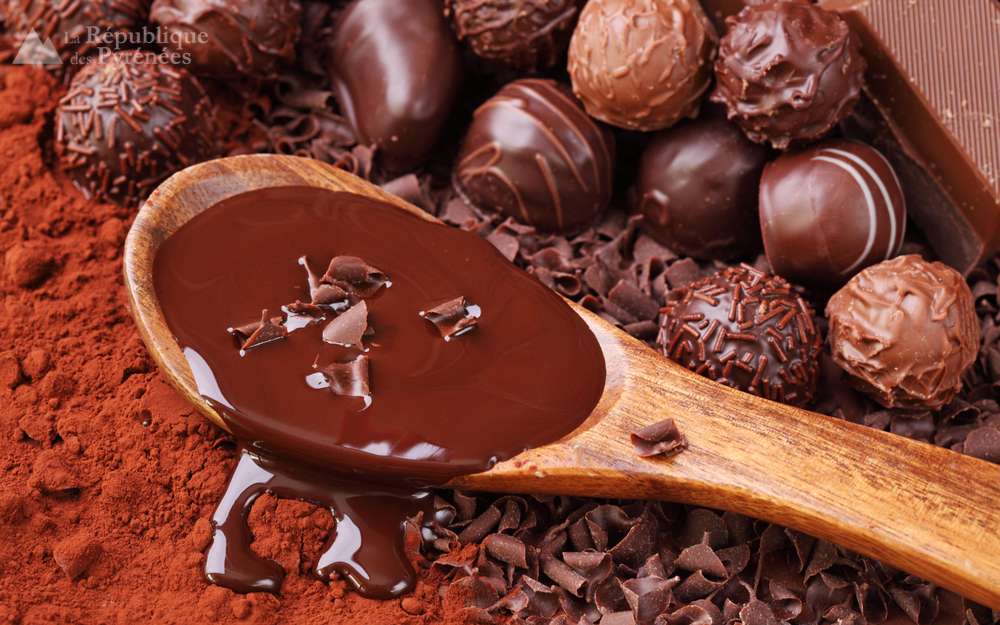As in many places, chocolate is a big part of Basque life. On birthdays, instead of the birthday cake familiar in the United States, Basques often drink a cup of liquid chocolate. It wasn’t so long ago, in the early 1800s, that chocolate was a common part of breakfast in the Basque Country. It was often viewed, not as a treat, but as a health drink, inspired, in part, by the way the Mayans and Aztecs used it as, effectively, an energy drink. Indeed, Hernán Cortés noted how drinking cocoa could help one resist fatigue. But, the Basques were also a big part of the development and commercialization of chocolate.

- Europeans first encountered cocoa during the conquests of the “New World.” The first reference to cocoa was in 1502, when Christopher Columbus encountered the Mayans. It wasn’t long, in 1520, before the Spanish brought cocoa back to the Iberian peninsula, where they made chocolate by adding sugar to the cocoa. The Spanish guarded their secrets carefully and it wasn’t until 1600 that first Italy and then France learned how to make chocolate.
- Baiona became an important center for making chocolate when the Jews that were expelled from Spain by the Catholic Kings. By 1670, the city was giving chocolate as a gift to visitors. In 1761, the statutes of the chocolatiers of Baiona were passed, saying that one had to be a Master to open a chocolate shop in the town. At the same time, though, the Jews that had originally brought the art of making chocolate to the city were banned from selling it outside their own district. By the end of the 18th century, half of the chocolate consumed in France was produced in Iparralde, or the French Basque Country. There is an annual festival in Baiona celebrating chocolate!
- On the Spanish side, in 1728, the Real Compañía Guipuzcoana de Caracas was created to encourage trade between Spain and the Indies, at least in part as a reaction against Dutch trade with the Spanish colonies and the inability of the Spanish crown to control that trade — they wanted to break the Dutch monopoly on cocoa. This company enjoyed two special privileges, given by royal decree: a monopoly on the commercialization of cacao and the ability to persecute illegal trade. It wasn’t until 1774, again due to royal decree, that trade opened up between other countries of Europe and cacao producers in South America. This led to the first chocolate factory, founded in 1776, in France. The company dissolved in 1785. The company had a large role in the politics of Venezuela, including border expeditions such as that led by a company man, José de Iturriaga y Aguirre.
- The chocolate company Elgorriaga was founded in 1770. It arose from shepherds going to market in Irún, Gipuzkoa. Some of the shepherds opened a chocolate business. In the 19th century, the wife of one of the shepherds opened a shop, calling it Confitería Elgorriaga, after the family. Today, the company is now part of the larger Urbasa Global Brands. While not its own company any more, Elgorriaga chocolates can be found the world-over.
Primary Source: Aguirre Sorondo, Antxon. Chocolate. Enciclopedia Auñamendi, 2019. Available at: http://aunamendi.eusko-ikaskuntza.eus/es/chocolate/ar-36174/
Discover more from Buber's Basque Page
Subscribe to get the latest posts sent to your email.


Very interesting, as always. ¡Zorionak berriro!
In fact, Still today Baiona’s chocolate (le chocolat de Bayonne) is advertised and sold all over France as a delicatesse.
You are right when you say that the tradition of chocolate making was brought into Baiona by the Jews expelled from Spain and Portugal. They were refered to as “ceux de la Nation Portugaise” (those coming from the Portuguese Nation). ( https://www.histoire-du-chocolat-basque.fr/histoire.html )
(By the way, Baiona still holds Europe’s second biggest Hebrew cemetery).
By 1870 Baoina had 130 maîtres chocolatiers, more than there were on the whole of Switzerland, that was reknown by its Masters Chocolatiers ( https://www.lexpress.fr/styles/saveurs/pays-basque-et-chocolat-une-histoire-d-amour_907488.html )
And refering to Jews, Balmaseda (Biscay) was the first place in Spain where the Jews were expelled from, in 1486. The prosecution was even worse and thougher that the one decreed six years later in the rest of Spain by Isabel of Castile and Ferdinand of Aragon, the Catholic Monarchs.
But the Jews left a legacy in Euskadi. Among many other things, the txakoli wine. The Hebrews were known for growing vineyards to produce the wine they used in their rites. And to say grace they used to say (and still do): “Shehacol Nihiá Bidvaró”.
And Shehacol Nihiá sounds pretty similar to the Basque word for wine: txakoliña. In fact, this word is believed to have been taken from Hebrew. ( https://youtu.be/Pe_IbEKz1Jw?t=2676 )
On the other hand, the song ‘Golden Jerusalem’, written by Naomi Shemer, in 1967, is considered as Israel’s unofficial national anthem. Although she denied it for most of her life, she finally admitted on her deathbed that she had taken the music from the Basque lullaby ‘Peio Joxepe’.
‘Golden Jerusalem’ (‘Yerushalayim shel zahav’) is sung on the final scene of ‘Schindler’s List’.
¡Zorionak! ¡Beti aurrerá!
Thanks for this great information. I didn’t know any of this. I really appreciate you sharing. I’ll certainly delve deeper into this.
Ez dago zergaitik, lagun! I really appreciate your über interesting work. Keep it up! ¡Aurrera beti!